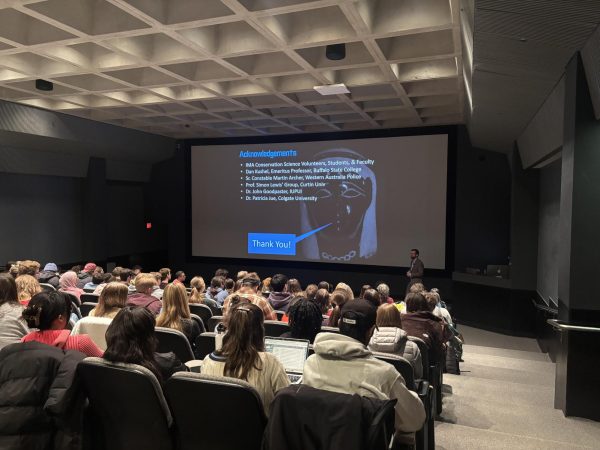IGD Pedagogy Guides Student and Professors Through Difficult Conversations in the 1619 Project Wellness Discussion Group
Beginning on Sept. 7, Mabel Dart Colegrove Commons’ 1619 Project Wellness Discussion Group, which was initially brought to Colgate by Colgate Hello, met for the first time. Facilitated by Associate Professor of Environmental Studies and Africana and Latin American Studies, April Baptiste, and Senior Lecturer in Writing and Rhetoric and Coordinator of Second Language Writing, Suzanne Spring, the group met twice per week for an hour over the course of three weeks and it followed a curriculum adapted from Colgate Hello’s faculty and staff 1619 Discussion group. Before each discussion, student participants listened to one podcast episode from the 1619 Project—a six-part series by Nikole Hannah-Jones—and completed reflections after each group meeting. As summarized by Rupika Chakraverti ‘20 on the Commons’ event invitation for the 1619 Project Group, the 1619 Project “Trace[s] the origin of American democracy and capitalism” and “precisely carves out the path that led from the twenty-something Africans from present-day Angola on that first ship to current African American culture and identity.”
Considering the deeply relevant and significant subject-matter of the 1619 Project podcast series, Mabel Dart Colegrove Commons structured the Wellness Discussion Series to be facilitated through Intergroup Dialogue (IGD) pedagogy—a mode of teaching and learning that was specially crafted for enabling conversations about difference. According to Spring, IGD was brought to Colgate in December of 2013, though its origins lie at the University of Michigan, where it was created to facilitate conversations about race and racism following Rodney King’s assault by police officers in 1991.
“The country was trying to reckon with racism and police brutality. [IGD] comes out of a very particular institution but it’s been built as a whole field of study for about thirty years,” Spring said.
While IGD was created to spark conversation between binary identities, the professors make it clear that their goal was not to institute or perpetuate the dichotomization of methods of identification. Instead, as articulated by Baptiste, their intention was to create a dynamic that is equivalent to a Christian “engaging in conversations with someone who is not Christian without evangelizing.” The goal is to foster an interaction that seeps “deeper than tolerance.” Another goal of IGD is to encourage conversation and understanding—such as the acknowledgement of privilege—across various identities. In order to accomplish the goal of actively listening to and conversing with people from various backgrounds without communicating through debate-like dynamics, a crucial first step for the 1619 Group was self-reflection—specifically within the context of the central concerns of the 1619 Project—the history of racism and capitalism.
In order to achieve this goal, Baptiste and Spring believe that it is essential for group facilitators—students and professors—to be able to relate with students. As such, it is important that facilitators come from various backgrounds. Baptiste partially attributes her desire to co-facilitate with Spring to the difference in their identities.
“The structure of IGD helps in having core facilitators with different identities. And not just binaries—[for example] a black identifying and a white identifying person. They have multiple layers of differences to try to help to compliment some of the experiences that different persons in the groups may also have…and be able to resonate with,” Baptiste said.
Because both professors come from different racial and academic backgrounds, Baptiste believes that they bring distinct insights and approaches to discussion about the 1619 Project.
As IGD guided students within the 1619 Project Group through conversations about race and capitalism, Baptiste and Spring understood that some students found personal resonance in and with the historical trauma embedded within the podcast more than others. Though both professors emphasized that IGD does not involve social work, they do believe that when IGD is implemented, it aids participants in understanding and processing the trauma that may be associated with the subject-matter at hand.
“[IGD] allows as a model for how to allow yourself to not just think intellectually of content but to understand it experientially,” Spring said.
Another reason why IGD is particularly effective in this process is because both professors and students are given similar authority over conversations.
“One of the reasons I like IGD is because it seeks for students to become agents in also facilitating dialogue. So you’re not just in there to be a person practicing under the tutelage or facilitation of your professor, you’re also learning how to do that dialogue yourself,” Spring said.
For students who may not resonate with the emotional trauma attached to the material discussed in the 1619 Group, the IGD process is important.
“It acts as a springboard for imagining privilege and marginality and prompts students to consider how they can make Colgate University genuinely a place for all,” Baptiste said. “I wanted my students to be able to see that…they are the people who change the institution,” she added.
As Baptiste described their end-goal for the 1619 Group, Spring noted that in order to achieve their aforementioned goal there has to be a lot of grace that people grant each other during the IGD process. In addition, Spring considers another important step in achieving this goal to be the process of equipping participants in the 1619 Group with the proper language needed in order to process history and experiences.
In reference to the application of IGD to the content of the 1619 Project podcast series, it was essential to foreground all conversation with this understanding.
“History is prisoner and we’re not disconnected from the history [of slavery],” Baptiste said. “What we were intending to do is to get students to realize that the history is personal, and that we are not disconnected from this history and that you cannot continue to say that ‘you can’t blame me—a white person—because my family didn’t own enslaved persons,’ or you can’t say ‘as a black person stop talking about slavery because you weren’t there,’ even if you do not use that language,” she added.
Spring further stressed that the discussion group was also intended to guide students through the process.
“[We have to] consider how the deeply harmful, deeply violent structures implemented in the past impact and embody modern American systems today,” Spring said.
As Baptiste and Spring conclude their first 1619 Project Wellness Discussion Group, they begin the process of planning for a second 1619 group that will meet later this semester. Though Baptiste and Spring have contributed lots of time and effort into this discussion group, they clarify that they do not see themselves as the “initiators” of IGD or even of conversation about the 1619 Project.
“It is within a larger process that we see ourselves as a part of…it is a cumulative process that we are a part of,” Spring insisted.

Sophia Zanussi is a senior from Evanston, IL concentrating in English literature and minoring in Middle Eastern and Islamic studies. She has previously...







